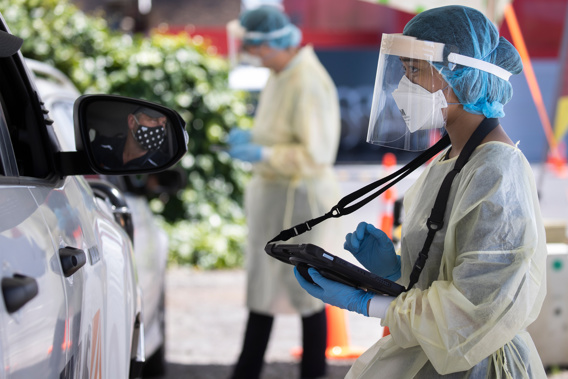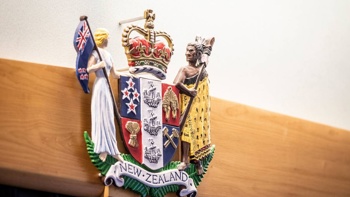
Twenty-four more Covid-19 related deaths were reported by health authorities yesterday, as the total number linked to the virus reached 141.
Yesterday, the Ministry of Health announced 19,452 community cases of Covid-19. There were 971 people in hospitals around the country, including 21 people receiving intensive care treatment.
Sixteen of yesterday's reported deaths had occurred over the past three weeks while eight people had died on Tuesday. Delays in the reporting of the deaths could be linked to people dying with, rather than of Covid-19, and the virus being discovered after they had died.
Eight had died at aged residential care. Overall, the average age of the people whose deaths were announced yesterday was 79 and this has been increasing over the past week.
"At this point in the outbreak, we are seeing increasing numbers of people dying with Omicron. Sadly, this trend is not unexpected, and our thoughts are with the families of these people," the ministry said.
Bloomfield defends isolation rules
Newstalk ZB's Mike Hosking this morning asked Director-General of Health Ashley Bloomfield this morning about why tourists could soon arrive and travel in the country, while New Zealanders who were household contacts of a Covid case but had tested negative were stuck isolating at home.
Bloomfield defended the isolation rules, saying household contacts were the highest risk of becoming a Covid case, quoting the example of NZ's Covid-19 Response Minister Chris Hipkins yesterday.
On moving away from New Zealand's red light Covid settings, Bloomfield says officials are reviewing things every two weeks.
He said, when the borders open, he understands people will want to be able to move freely while keeping safe.
On moving out of red, Bloomfield said what is taken into account was the country's positivity rate and hospitalisations.
Nearly 1000 people are in hospital with Covid currently.
When pressed on whether the health system is really under stress purely because of Covid infections, Bloomfield told Hosking to talk to staff in hospitals who are feeling the pressure every day.
Bloomfield said the issue - with close to 1000 Covid patients in hospital - was that staffing levels were stretched.
On vaccination rates, Bloomfield says we need three doses to protect against Omicron.
He is looking at providing advice to the government about whether a booster will be a new requirement for vaccine passports.
"We would like to get above 90%" of the population boosted, he said.
Bloomfield was looking into advice about whether over 65s should receive a fourth Covid-19 vaccine, he told Hosking.
Speaking with TV3's AM show earlier this morning, Bloomfield said there was no crisis in the health sector, despite Omicron stretching health services.
He said some care was being deferred, such as cervical screenings, and it was important to come up with a plan to catch up on care that was postponed.
Bloomfield says they are planning for the winter flu season, with district health boards across the details. They're planning extra flu vaccinations to combat an expected flu wave.
Bloomfield was coy on his stance on dropping mandates, and said he'll leave that decision to the PM.
Bloomfield says the country hasn't reached the peak of Omicron.
"We have hit the peak in Auckland" though, he said.
He said they often see this trend in terms of the flu, with the rest of the country delayed in its peak when compared with Auckland.
On crowd sizes at live sport, Bloomfield says outdoor venues are much less of a risk compared with indoor settings.
The average time people were spending in Northern region (Auckland and Northland) hospitals was also growing while the average age was increasing, the ministry said, indicating those being admitted were more likely to be vulnerable because of their older age and pre-existing non-Covid health conditions.
Yesterday, 971 people were in Northland (25), North Shore (174), Middlemore (243), Auckland (205), Waikato (73), Bay of Plenty (39), Lakes (13), Tairāwhiti (2), Hawke's Bay (30), Taranaki (14), MidCentral (19), Hutt Valley (26), Capital and Coast (39), Wairarapa (5), Nelson Marlborough (12), Canterbury (37), South Canterbury (2) and Southern (13) hospitals.
The community cases announced yesterday were in Northland (661), Auckland (5318), Waikato (1834), Bay of Plenty (1347), Lakes (584), Hawke's Bay (1049), MidCentral (802), Whanganui (231), Taranaki (663), Tairāwhiti (370), Wairarapa (208), Capital and Coast (1308), Hutt Valley (780), Nelson Marlborough (487), Canterbury (2385), South Canterbury (184), Southern (1203) and the West Coast (30).
The location of seven of the cases was unknown, the ministry said.
University of Otago epidemiologist Professor Michael Baker said there had been three case number peaks in New Zealand, starting with Auckland which appeared to peak almost two weeks ago.
This was followed a week later by locations near the city, such as Waikato, Northland and the Bay of Plenty, as well as Capital and Coast and Hutt Valley DHB regions further south.
"Now we are seeing the rest of the North Island and the South Island catching up, another week after that. We are seeing, in a sense, three peaks."
Hospitalisation figures in Auckland also looked like they may have peaked but these rates were still increasing for the rest of the country – however the rise generally was slowing.
"The rest of New Zealand, I think we expect it to keep rising because of the lag time," Baker said.
"Auckland now tells us what the rest of the country can expect in terms of the size of this pandemic wave. It does give us an indication that the hospitals can manage it, and ICUs, but it is a real strain."
As of yesterday, 95.3 per cent of eligible people aged 12 and older had been double vaccinated and 72.8 per cent of those due their booster had received it.
For Māori, 88 per cent have received two doses and 59.3 per cent of those eligible have been boosted.
For Pacific peoples, these figures were 96.4 per cent and 59.7 per cent, respectively.
'We're up and running' - Air NZ boss
Yesterday, Prime Minister Jacinda Ardern announced the country was "ready to welcome the world back" after receiving advice it was safe to bring forward the next stage of the border reopening plan to usher in tourists.
Vaccinated Australians, including permanent residents, will be able to come to New Zealand without isolating from 11.59pm on Tuesday, April 12. Fully vaccinated travellers from visa-waiver countries will be able to enter the country from 11.59pm on May 1.
Air NZ boss Greg Foran this morning told Newstalk ZB's Mike Hosking "yesterday was good" but overall ticket sales had already been gradually building.
He said there was a good mixture of people purchasing tickets to come and go from New Zealand.
"We're up and running, which is exciting.
"To get the Tasman back gets us back on our feet."
He said international travel was "a little more clunky" than before, but people who wanted to travel would still travel.
He said by the end of the year Air NZ expected a reasonable amount of tourists back in the country.
He expected a steep uptake at first as people reunite with family and friends, and it would build from there, he said.
"I think people have felt that as Omicron made its way through that things would start to change."
Pre-Covid Tasman tourism made up 15 to 20 per cent of Air NZ's business, so getting Australian flights back would make "quite a difference", he said.
"And of course, getting [other] countries back up and running from May will make a difference."
He said those who will want to travel from further afield, such as Europe, will know there will be hoops to jump through.
Travellers would need to prove they're vaccinated, get pre-departure tests and filling out various forms.
"But those who want to travel will travel."
Tourists from China not travelling could be an issue, he said, because it was a big market.
He said Air NZ was still committed to raising capital, as long as the market was in place to allow it to get under way at the end of the month.
Slow the spread: immunologist
University of Otago immunologist and associate dean (Pacific) Dr Dianne Sika-Paotonu yesterday said New Zealanders needed to do everything they could to slow the spread of the virus while people got boosted and children were vaccinated.
"It is important to note that Pacific peoples currently make up 21 per cent of Covid-19 cases and 38 per cent of all hospitalisations."
Children, tamariki and tamaiki and rangatahi aged 19 years and under made up nearly one third (31 per cent) of those affected by the current outbreak and 12 per cent of all hospitalisations, Sika-Paotonu said.
By yesterday, 53.5 per cent of eligible children aged 5-11 had received one dose of Covid-19 vaccine. These figures for Māori and Pacific children were 34.1 per cent and 46.3 per cent, respectively.
Professor Michael Plank, of Te Pūnaha Matatini and the University of Canterbury, said reopening the border with no quarantine was "a huge milestone" but it didn't mean the pandemic was over.
"We can't completely forget about Covid-19 and we still need a toolbox of sustainable measures to control transmission of the virus in the community."
However, New Zealand now had comparable levels of infection as other countries meaning border restrictions were no longer an effective tool for reducing community transmission, Plank said.
Senior lecturer at Auckland University's Centre for Computational Evolution and School of Computer Science Dr David Welch said with the large rise in the number of travellers coming into the country, New Zealand could expect to see any new major variants that arise internationally to spread here fairly quickly.
"We will no longer have the luxury of time to watch and prepare as any new variants take hold overseas."
Local surveillance efforts, including genomic surveillance of variants circulating in the community, needed to be increased and improved, he said.
Dr Sika-Paotonu said overseas travellers entering New Zealand who hadn't had their booster shot should be encouraged to have it.
"Even with our highly vaccinated population in Aotearoa New Zealand, it will be difficult to prevent likely rapid spread of a new SARS-CoV-2 variant if it is capable of evading the protection given by currently-available Covid-19 vaccines."
Take your Radio, Podcasts and Music with you









